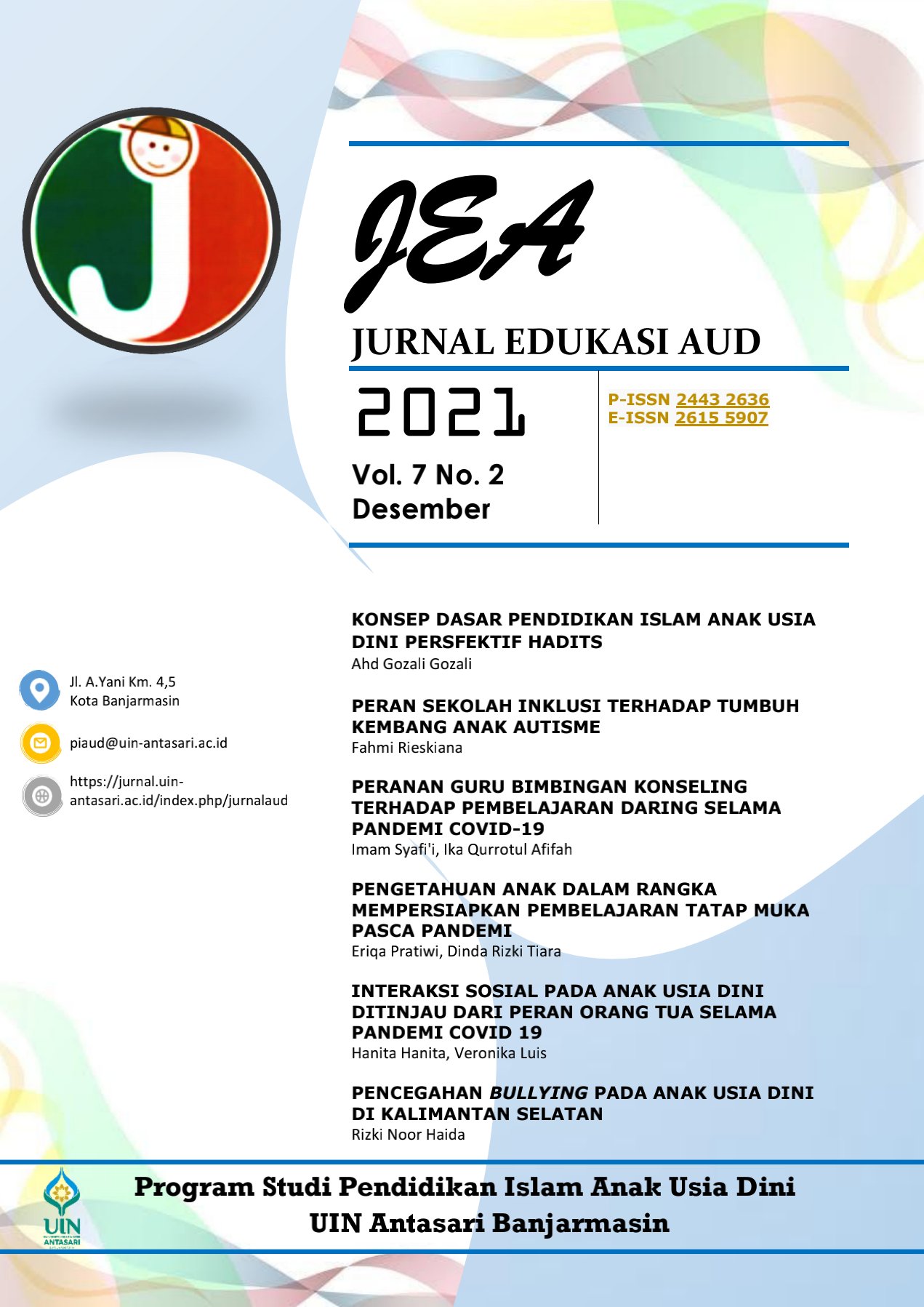INTERAKSI SOSIAL PADA ANAK USIA DINI DITINJAU DARI PERAN ORANG TUA SELAMA PANDEMI COVID 19
DOI:
https://doi.org/10.18592/jea.v7i2.5971Keywords:
Social Interaction, Early Childhood, The Role Of Parents.Abstract
There is a Covid-19 pandemic event where the rules limit interaction between humans and other humans. This rule also has an impact on early childhood, where they currently only carry out social interactions at home. However, the government issued rules related to the procedures for social interaction by complying with the Health protocol. As a result of this event, in the end, it limits the child's stimulus related to the child's social development. Research methodology Qualitative methods. The analysis in this study is the interaction of children in terms of the role of parents during the covid-19 pandemic. The research subjects consisted of 14 children aged 3-6 years. The technique used is to distribute a questionnaire through a google form, which will be filled out by parents. The data analysis phase consists of data organization, coding and data analysis. To test the credibility of the data using the data pol- ulation technique. Research results parents who allow children to keep playing with their peers because of the awareness of the characteristics of the child. Where children will be able to form attitudes and the ability to communicate with social interaction. This is supported by providing guidance and knowledge regarding the impact of the COVID-19 virus and the procedures for Health protocols when outside the home. However, there are also parents who do not allow their children to be friends with their peers for fear of contracting the Covid-19 virus.References
Ajeng Rahayu Tresna Dewi, Mira Mayasarokh, E. G. (2020). Perilaku Sosial Emosional Anak Usia Dini. Jurnal Golden Age, 4(01), 181–190. Retrieved from https://doi.org/10.29408/jga.v4i01.2233
Dinawati, Y., Syaodih, E., & Rudiyanto. (2018). MENINGKATKAN KEMAMPUAN INTERAKSI SOSIAL ANAK MELALUI METODE BERMAIN PERAN MAKRO. EDUKIDS: Jurnal Pertumbuhan, Perkembangan, Dan Pendidikan Anak Usia Dini, 15(229), 42–58.
Ghunaifi, A. (2015). MERESTORASI INTERAKSI SOSIAL PADA ERA TEKNOLOGI MELALUI PENDIDIKAN JASMANI & OLAHRAGA Aang. Prosiding Seminar Nasional Profesionalisme Tenaga Profesi, 531–540.
Herawati, & Muthmainnah. (2019). Karakteristik Belajar Anak Usia Dini Dalam Perspektif Islam. Jurnal Pendidikan Anak Bunayya, 5(1), 1–23.
Kiki Safitri, T. F. (2021). Dampak Pembelajaran Daring terhadap Interaksi Sosial Anak. PAUD Lectura: Jurnal Pendidikan Anak Usia Dini, 5(1), 143–152. Retrieved from https://doi.org/10.31849/paud-lectura.v
Kurniati, E., Nur Alfaeni, D. K., & Andriani, F. (2020). Analisis Peran Orang Tua dalam Mendampingi Anak di Masa Pandemi Covid-19. Jurnal Obsesi : Jurnal Pendidikan Anak Usia Dini, 5(1), 241. Retrieved from https://doi.org/10.31004/obsesi.v5i1.541
Latifah, U., & Sagala, A. C. D. (2015). Upaya Meningkatkan Interaksi Sosial Melalui Permainan Tradisional Jamuran Pada Anak Kelompok B Tk Kuncup Sari Semarang Tahun Pelajaran 2014/2015. Penelitian PAUDIA, 112–132.
Lestari, I., Riana, A. W., & Taftazani, B. M. (2015). Pengaruh Gadget Pada Interaksi Sosial Dalam Keluarga. Prosiding Penelitian Dan Pengabdian Kepada Masyarakat, 2(2), 204–209. Retrieved from https://doi.org/10.24198/jppm.v2i2.13280
Lewis, S., Savaiano, M. E., Blankenship, K., & Greeley-Bennett, K. (2014). Three areas of the expanded core curriculum for students with visual impairment: Research priorities for independent living skills, self-determination, and social interaction skills. International Review of Research in Developmental Disabilities, 46. Retrieved from https://doi.org/https://doi.org/10.1016/B978-0-12-420039-5.00002-2
Lilawati, A. (2020). Peran Orang Tua dalam Mendukung Kegiatan Pembelajaran di Rumah pada Masa Pandemi. Jurnal Obsesi : Jurnal Pendidikan Anak Usia Dini, 5(1), 549. Retrieved from https://doi.org/10.31004/obsesi.v5i1.630
Maghfiroh, A. S., Usman, J., & Nisa, L. (2020). Penerapan Metode Bermain Peran Terhadap Perkembangan Sosial Emosional Anak Usia Dini di PAUD/KB Al-Munawwarah Pamekasan. Kiddo: Jurnal Pendidikan Islam Anak Usia Dini, 1(1), 51–65. Retrieved from https://doi.org/10.19105/kiddo.v1i1.2978
Permatasary, N. R., & Indriyanto, R. (2016). Interaksi Sosial Penari Bujangganong Pada Sale Creative Community Di Desa Sale Kabupaten Rembang. Jurnal Seni Tari, 5(1), 1–15. Retrieved from https://doi.org/10.15294/jst.v5i1.9635
Prabowo, S. H., Fakhruddin, A., & Rohman, M. (2020). PERAN ORANG TUA DALAM PEMBENTUKAN KARAKTER ANAK DI MASA PANDEMI COVID-19 PERSPEKTIF PENDIDIKAN ISLAM. Pendidikan Islam, 11(2), 191–207.
Putro, Khamim, dkk. (2020). Pola interaksi anak dan orangtua selama kebijakan pembelajaran di rumah. Fitrah: Jurnal of Islamic Education, 1(1), 124–140.
Riza, L. U. (2016). Perkembangan Sosial Anak Usia Dini Pengguna Gadget. Psikosains, 11(2), 82–98.
Rohayati, T. (2018). Pengembangan Perilaku Sosial Anak Usia Dini. Cakrawala Dini: Jurnal Pendidikan Anak Usia Dini, 4(2), 131–137. Retrieved from https://doi.org/10.17509/cd.v4i2.10392
Downloads
Published
How to Cite
Issue
Section
License
Authors who publish with this journal agree to the following terms:
- Authors retain copyright and grant the journal right of first publication with the work simultaneously licensed under a Creative Commons Attribution License that allows others to share the work with an acknowledgement of the work's authorship and initial publication in this journal.
- Authors are able to enter into separate, additional contractual arrangements for the non-exclusive distribution of the journal's published version of the work (e.g., post it to an institutional repository or publish it in a book), with an acknowledgement of its initial publication in this journal.
- Authors are permitted and encouraged to post their work online (e.g., in institutional repositories or on their website) prior to and during the submission process, as it can lead to productive exchanges, as well as earlier and greater citation of published work.

JEA (Jurnal Edukasi AUD) by http://jurnal.uin-antasari.ac.id/index.php/jurnalaud/index is licensed under a Creative Commons Attribution 4.0 International License.










